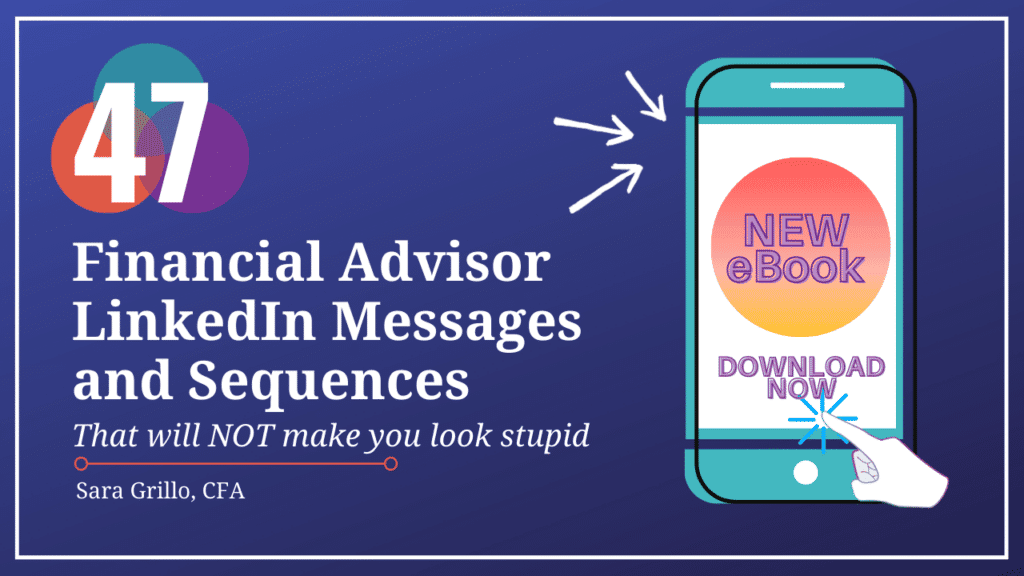The industry would have you convinced that they are the superheroes who save the world. This is a blunt-as-heck assessment of the question, “what does a financial advisor do on a daily basis?” There are three major things all financial advisors do – and I’m about to tell you the real story not the BS “spiel” on a financial advisor job description. So let’s get started!
For those of you who are new to my blog/podcast, my name is Sara. I am a CFA® charterholder and I used to be a financial advisor. I have a weekly newsletter in which I talk about financial advisor lead generation topics which is best described as “fun and irreverent.” So please subscribe!

Some of them don’t do anything (anymore)
Before I go into the three major parts of what a financial advisor does, I’m going to be honest: some of them, in fact a stupefying number of them, do next to nothing.
Weeellll, let me reframe that.
They used to do a heckuva lot, but now they’re established in their practice, they have employees to run around and be gophers, and alot of their time is spent on the golf course.
But to be real, they earned it. A lot of them came up decades ago in the cold calling pits at brokerages like Shearson Lehman Hutton, Merrill Lynch, or Paine Webber. They hustled for years, eventually “made it”, and now it’s cake where they’re making in some cases $1mm a year (yeah, financial advisors can make a ton of dough). So just because you see the pretty picture, don’t be deceived; when you are in the throes of establishing your practice, being a financial advisor is hard as hell.
If you’re reading this blog because you’re thinking about pursuing a career in wealth management, there are five steps to follow. Think hard about it before you embark, by the way.
What is a financial advisor?
Let’s start first with the definition of what a financial advisor is. A financial advisor goes by many names. Some call themselves wealth managers, or if they work for a bank, private bankers. Others may go by the term “financial consultant”, but that is a bit less common.
If they are more focused on a particular discipline, they may call themselves investment advisors or financial planners. But no matter what they are called, the financial advisor’s job description is what matters more. Take a moment to learn the key differences between a financial advisor and financial planner.
People hire financial advisors because there is some sort of challenge in their lives, such as retiring, selling a business, or putting a kid through college, that they can’t handle themselves due to lack of technical knowledge or time.
The skills you’ll need to be a good financial advisor are a combination of technical and interpersonal prowess, and a lot of grit because it’s hard to make it and even once you do, markets can be unpredictable and regulators are unrelenting.
Three major parts to a financial advisor’s daily job
If I had to write a financial advisor job description, there would be three major parts.
#1 Selling
Let there be no equivocation. This is a sales job. If you can’t sell, you can’t make it as a financial advisor.
A financial advisor is an entrepreneur. You start with nothing and build a book of high net worth clients from scratch unless you somehow inherit one from the company you are working for.
You have a higher chance of being hit by lightning than that happening, by the way, because most of the time they’ll offer it to you for a price you’ll have to go into six figure debt to pay.
Most wealth management firms are established once they reach $100MM in AUM, or about 100-150 clients. But that’s not a requirement. I’ve seen some advisors do well with fewer clients that have larger portfolios, or that you provide a deeper set of services for at a higher profit margin.
There are a variety of ways to go about marketing your wealth management firm. Getting clients on social media sites such as LinkedIn, Facebook, etc., has become a popular way. Other methods are detailed in this blog about getting wealthy clients. Whatever the way, do it with integrity.
#2 Executing technical tasks that vary in level of complexity
A typical day in the life of a financial advisor probably goes something like this.
- Get up, check the markets and read the economic news.
- Respond to client emails.
- Have 2-3 client calls in the AM/respond to client inquiries.
- Prospect for 1-2 hours, read industry publications, or participate in training.
- Check the markets at noon time.
- Go out to visit a prospect or client in the afternoon.
- Return to office, check email and settle any client servicing requests before leaving for the day.
Some advisors are more sophisticated and deal with wealthier people, while others deal with emerging affluent. It’s hard to say where any one wealth manager falls on the spectrum, but the work typically includes some of the following:
- Financial planning
- Managing investments
- Tax planning
- Talking to your clients’ estate attorney or accountant about tangential issues related to the money you are in charge of
- Helping clients fill out paperwork
- Cash flow analysis
- Budgeting
- Credit card analysis
- Insurance analysis
- Protecting your clients from identity theft and fraud
- Working with custodians to ensure your clients’ accounts are in good order
- Executing trade requests through a broker and confirming they were done correctly
- Writing up portfolio and wealth reviews for your clients’ annual reviews
- Responding to ad-hoc questions and requests from your clients
- Dealing with financial advisor compliance and staying up to speed with regulation
- Sending wire transfers and managing client account transfers
- Overseeing your billing and making sure accounts are properly charged
Items on this list could also suffice as an answer to the question of what an insurance agent does, what a financial consultant does, etc.
#3 Being a personal butler to rich people
It’s hard to say no to someone who is paying you $12k a year. I’ve heard of financial advisors doing the most ridiculous things (shoveling snow, taking clients to the car dealership to buy a new car).
Weird stuff, ok?
And that’s exactly what happens when you are there to serve people in such an intimate way. You almost become like their family in some cases.
The degree to which you may get involved with your clients outside of the typical scope can vary. A lot of advisors consider their clients their friends and even family in some cases.
The point I’m making is that this is a very human job, and like anything involving humans, feelings are involved. Managing other people’s emotions is just as important in this role as the technical things that you do.
…and that’s what many financial advisors tend to find the most rewarding parts of the job.
But it’s your call if you want to keep it 100% professional or not.
Sara’s upshot on a daily in the life of a financial advisor/financial advisor job description
What’d ya think? Was this helpful?
If yes…
Learn what to say to prospects on social media messenger apps without sounding like a washing machine salesperson. This e-book contains 47 financial advisor LinkedIn messages, sequences, and scripts, and they are all two sentences or less.

You could also consider my financial advisor social media membership which teaches financial advisors how to get new clients and leads from LinkedIn.

Thanks for reading. I hope you’ll at least join my weekly newsletter about financial advisor lead generation.
See you in the next one!
-Sara G






